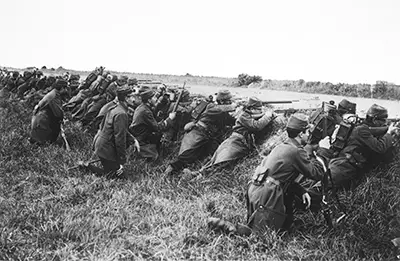First Battle of the Marne
German Backstory
German troops were at odds with what to do during the First Battle of Morne. With their advance halted, the only thing to do was to entrench their position until they could move forward again. They were already within 30 miles of Paris after successful battles in Belgium and Northeastern France.
At this point the German army was on a rapid pace, showing no signs of slowing down at it defeated British, Belgian, and French forces while marching deep into Northeastern France territory. Everything was going according to the Schlieffen Plan, which favored a quick defeat of France before returning their attention to the more powerful Russian Army in the East.
The German First Army was led by Alexander von Kluck and the Second Army was led by Karl von Bulow. The overwhelming forces from all sides with a mix of bad communication from the First and Second Army led German Chief of Staff Helmuth von Moltke to order a retreat on September 9th. After withdrawing to the north of River Aisne, the forces were entrenched their position, officially losing all of the ground they had just built up.


French & British Backstory
The French army was suffering heavy losses up to this point, with the German Army marching deep into their territory and threatening to defeat France. Paris prepared itself for a potential siege before the arrival of the German army, using its smaller but capable Fifth and Sixth Armies with a combination of British allies.
The French and British were already pretty beaten up at this point, with the unstoppable German forces getting stronger by the day. Joseph Jacques Cesaire Joffre was important in rallying the French forces and preparing them for an attack by launching his own counterattack on September 6th. The British allies were led by Sir John Denton Pinkstone French, and the Sixth Army proudly by Michel-Joseph Maunoury.
An attack that began on the right flank opened up a wide gap in the German lines, and the break was immediately exploited. With the British and the French working together, they were able to prolong the battle long enough for French reserve infantry troops to help beat back the German Forces.
The reserve troops were ferried from Paris in 600 taxi cabs, and amounted to a total of 6,000 extra men.

Why Was The First Battle of the Marne Fought?
Germany was following the Schlieffen Plan as set forth by Count Alfred von Schlieffen, which was as defensive as it was offensive. The main priority was to deal with the French Army as quickly as possible so they could concentrate on their more formidable enemy in Russia. The plan was wildly successful up to this point, and if not for the last minute heroics of 6,000 French reserve troops, it may have succeeded.

Who Was Affected?
Both the French and British forces were affected the most by the First Battle of the Marne, as they were already exhausted from the German push. Even after defending Paris from the attack, their forces had to recuperate for what would be a second charge for the city.
Germany suffered a bit of a blow to its original plans, and was forced to entrench a position much further off than it anticipated. This of course lowered the morale of their troops, which up to this point had been unstoppable.

Names to Remember
Alexander von Kluck and Karl von Bulow led the majority of the German Army in the battle. They were respected leaders considered to be among the best in the war. The First and Second Army had communication problems which also had a hand in their defeat, and could have turned the tide of victory if remedied.
Joseph Jacques Cesaire Joffre was born in 1852 and is nicknamed ‘Papa Joffre’. In 1911 he was appointed Chief of the French General Staff. He was also part of the development that led to the heavily criticized Plan XVII, a deeply inferior tactical plan to the Schlieffen Plan.

Important Facts
Here are some important things to remember about the First Battle of the Marne.
- France and Britain were joined as allied forces
- It took the emergency arrival of 6,000 reserve troops to drive back the German Forces
- The Schlieffen Plan was superior to many tactical outputs at its time, and almost succeeded
- Joseph Jacques Cesaire Joffre went on the attack to win the battle against the Germans

Summary
The battle could have went in Germany’s favor if help hadn’t showed up in time, and would have been assured if Joseph Jacques Cesaire Joffre didn’t put the original plan in motion. France and Britain delayed a very strong attack in a crucial part of the war.



